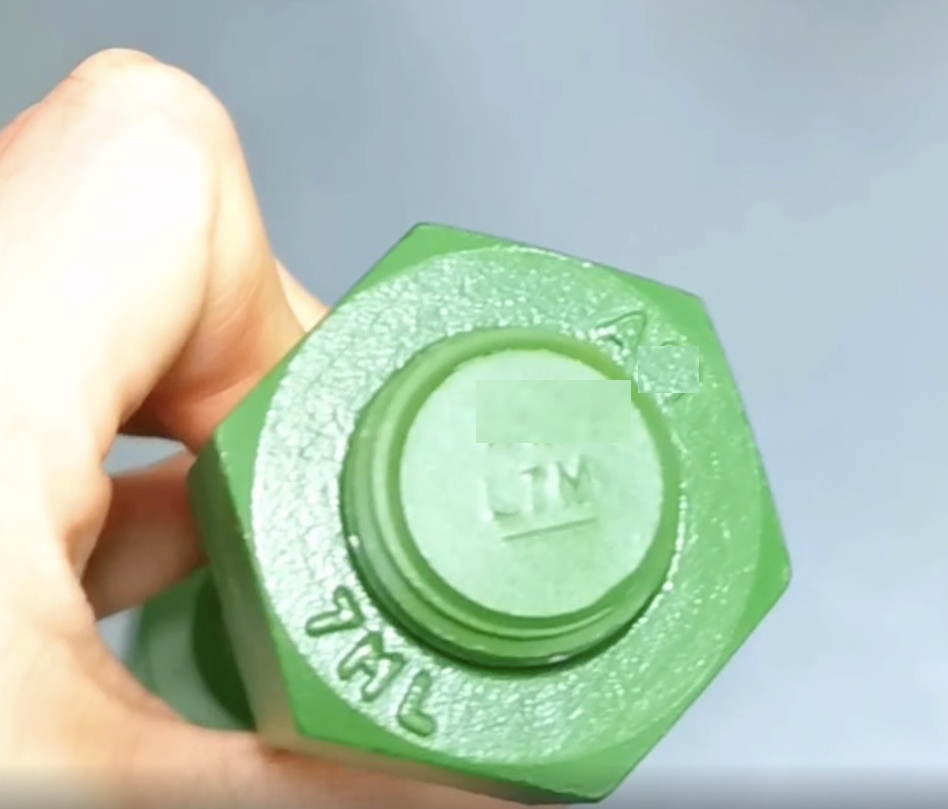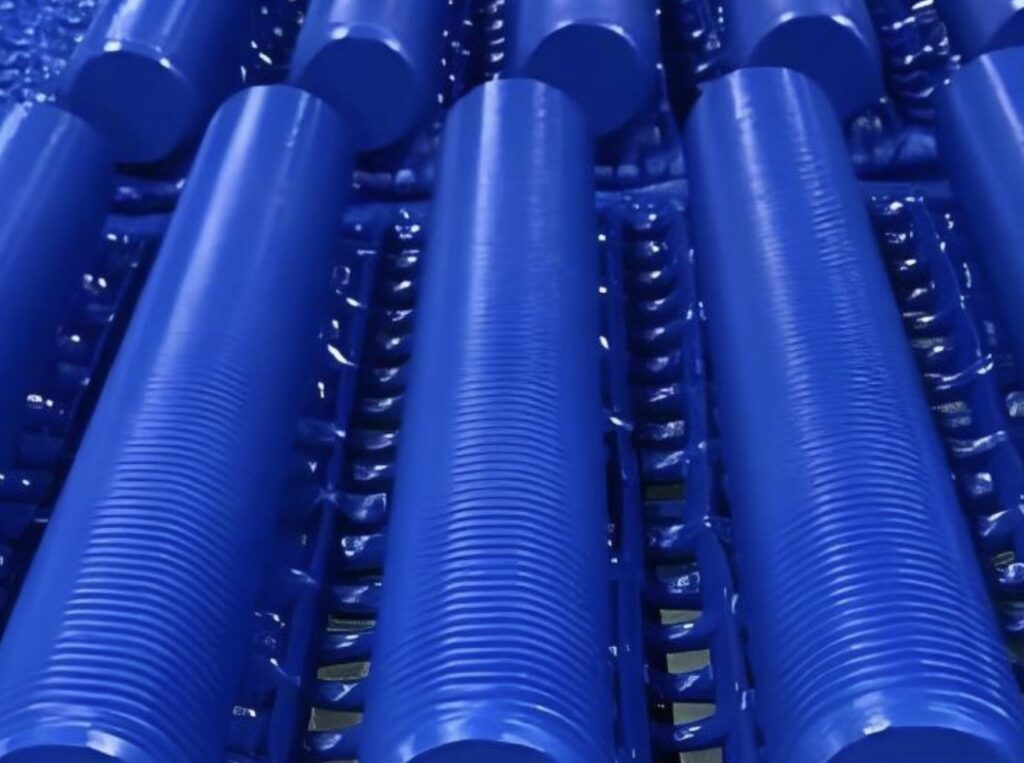ASTM A320 Gr. L7M STUD BOLT for Low Temperature service
We manufacture and supply L7M stud bolts, heavy hex nuts, and related fasteners designed for cryogenic and subzero conditions, including compliance with NACE MR0175 for sour service.
ASTM A320 is the specification covers alloy steel bolting materials for pressure vessels, valves, flanges, and fittings for low-temperature service
Grade L7M is a heat-treated chromium- molybdenum alloy steel with minimum tensile requirement under ASTM A320
ASTM A320 L7M Stud bolt is manufactured from AISI 4140 round bar and is supplied in a quenched and tempered condition.
ASTM A320 L7M Chemical composition
| Element | Composition, % A |
|---|---|
| Chromium Molybdenum B | |
| Carbon, max | 0.38 – 0.48 |
| Manganese | 0.75 – 1.00 |
| Phosphorus, max | 0.035 |
| Sulfur, max | 0.040 |
| Silicon | 0.15 – 0.35 |
| Chromium | 0.80 – 1.10 |
| Molybdenum | 0.15 – 0.25 |
ASTM A320 Impact Test Requirements (Notch Toughness)
| Size of Specimen, mm | Test Temperature | Minimum impact value required for average of each set of three specimens, ft-lbf [J] | Minimum impact value permitted for one specimen only of a set, ft-lbf [J] | |
|---|---|---|---|---|
| °F | °C | |||
| 10 X 10 | -100 | -73 | 20 [27] | 15 [20] |
| 10 X 7.5 | 16 [22] | 12 [16] | ||
Nuts Hardness Requirement for A320 L7M Stud bolt
A194 Grade 7M nuts at a hardness not exceeding 235 HBW (or equivalent) shall be used with Grade L7M bolts, studs, and stud bolts. All nut impact tests shall be made on test specimens taken from the bar or plate from the heat of steel used for manufacturing the nuts, and heat treated with the nut blanks.
A320 L7M Stud bolt heat Treatment
For L7M bolting, the final heat treatment, which may be the tempering or stress-relieving operation conducted at 1150 °F [620 °C] minimum, shall be done after machining or rolling of the threads and any type of cutting
A320 L7M Stud bolt Hardness requirement
The maximum hardness of Grade L7M shall be 235 HBW or 99 HRB (conversion in accordance with Table Number 2B of Test Methods and Definitions A370). Minimum hardness shall not be less than 200 HBW or 93 HRB. Conformance to this hardness shall be ensured by testing each bolt or stud by Brinell or Rockwell B methods in accordance with 6.3.1
Surface Treatments
- Plating
- Zinc (White / Yellow / Black)
- Cadmium (White / Yellow / Black)
- Zinc Nickel
- Plating
- Galvanising
- Hot-Dipped Galvanise
- Mechanical Galvanise
- Galvanising
- Fluorocarbon Coating
Xylan® / Dupont Coating Systems:- Xylar 2
- Xylan 1070
- Xylan 1424
- Fluorocarbon Coating
- Customised Coating Systems
- Zinc + Fluorocarbon / PTFE coated stud bolt
- Cadmium + Fluorocarbon /PTFE coated stud bolt
- Zinc Nickel + Fluorocarbon /PTFE coated stud bolt
- Zinc Plating + Xylan 1424 Blue PTFE coated stud bolt
- Xylar 2 + Xylan 1070 coated stud bolt
ASTM A320 L7M Stud bolt specification
| Property | ASTM A320 L7M Requirement |
| Material | Alloy Steel (AISI 4140/4142) |
| Tensile Strength | ≥ 100 ksi (690 MPa) |
| Yield Strength | ≥ 80 ksi (550 MPa) |
| Hardness | ≤ 235 HBW or ≤ 99 HRB |
| Impact Toughness | Charpy V-notch at -73°C |
| Heat Treatment | Quenched & Tempered |
| Corrosion Resistance | Suitable for sour service (NACE MR0175/ISO 15156) |
| Thread Type | UNC (Coarse) or UNF (Fine) Metric thread |
Difference Between ASTM A320 L7 vs. L7M
| Feature | L7 | L7M |
|---|---|---|
| Hardness | ≤ 35 HRC (≥ 248 HBW) | ≤ 235 HBW (≤ 99 HRB) |
| Application | General low-temp use | Sour gas (H₂S) service |
| Impact Test | Required at -101°C | Required at -73°C |
| Toughness | Moderate | Higher toughness |
| Corrosion Resistance | Standard | Better (NACE MR0175 compliant) |
L7M is specifically designed for environments with H₂S (sour gas), where lower hardness improves crack resistance.
Application of ASTM A320 L7M Stud Bolts
LNG Plants & Cryogenic Storage (-73°C / -150°F applications)
Petrochemical & Refineries (Piping, flanges, and equipment)
Offshore & Subsea Structures (Sour gas environments)
Power Plants & Boilers (Cold service bolting)
How to make quality ASTM A320 L7M Stud bot?
You would find the Inspection and Test Plan for the ASTM A320 L7M fasteners as below.
| Serial No. | Activity Category | Activity No. | Activity Name | Activity Details | Acceptance Criteria | Verification Documents |
| 1 | Document Review | 1 | DOCUMENTS REVIEW / APPROVAL BEFORE PRODUCTION | Review and approval of documents prior to production | ASTM A320 | N/A |
| ASTM A194 | ||||||
| Size standards are based on actual orders | ||||||
| 1.1 | Technical Specification and Standard | Check the revision of the SPECs and Standards. | ||||
| 2 | Material Incoming Inspection, etc. | 2 | MATERIAL INCOMING INSPECTION, VERIFICATION AND REVIEW OF MILL CERTIFICATES | Incoming material inspection, verification, and mill certificate review | – | – |
| 2.1 | Base Material Incoming Inspection | Mill Certificates Review; | ASTM A320 Table 3 | Reviewed & Approved MTC | ||
| VT (Visual Test), diameter, length check | ASTM A194 Table 1 | In-coming inspection record | ||||
| Raw material chemical composition recheck | Purchase Order | Incoming material re-inspection report | ||||
| Mechanical property re-inspection | ASTM A320 Table 3 | |||||
| ASTM A194 Table 1 | ||||||
| 3 | Manufacturing Process Control | 3 | Manufacturing Process Control | Manufacturing process control | – | – |
| 3.1 | Raw Material Cutting | Cut according to drawings or standards with appropriate allowance. | Customer required length | Traveller card & Cutting inspection record | ||
| 3.2 | Chamfering | 1 Pitch (thread pitch) x 45° | API 6A Appendix C | Traveller card & Cutting inspection record | ||
| 3.3 | Marking | Mark with LOGO and Material grade; | ASTM A320 | Marking list, Traveller card & Cutting inspection record | ||
| ASTM A194 | ||||||
| 3.4 | Thread Rolling and Tapping | According to ASME B1.1 or B1.13M | ASME B1.1/B1.13M | Traveller card & Cutting inspection record | ||
| 3.5 | Heat Treatment | Quenching + tempering | ASTM A320 | Heat treatment report | ||
| ASTM A194 | ||||||
| 3.6 | Mechanical Property Test | For studs: | ASTM A320 (for studs) | Tensile test report, Impact test report, Hardness Test report; | ||
| 3.6.1. Tensile test at Room Temperature (Per same heat No & Nominal diameter) | ASTM A194 (for nuts) | Tensile test report, Hardness Test report; | ||||
| 3.6.2. Impact test (Per same Lot & Nominal diameter): Test at -73℃, min average energy 27J, min single energy 20J. | ||||||
| 3.6.3. Hardness test: Test on tensile test sampling studs. | ||||||
| For heavy hex nuts: | ||||||
| 3.6.4. Proof test (d≤1 1/2″ ): Sampling as follows: | ||||||
| 3.6.5. Hardness test: Sampling as follows: Lot size ≤800 (1 sample); 801 – 8000 (2 samples); 8001 – 22000 (3 samples) | ||||||
| 3.7 | Coating | According to BM list | Coating process card | Coating record | ||
| 3.8 | Coating Inspection | 3.8.1. Salt spray test per ASTM B117, acceptance criteria: XXXX hours, rust area <15% | Coating process card | Coating inspection report | ||
| 3.8.2. Thickness test: ASTM F1137 microscopic exam of cross-section (perpendicular to significant surface) | ||||||
| 3.8.3. Curing test for Xylan XXXX: Whitford Test Method 115B | ||||||
| 3.8.4. Adhesion test: Whitford Test Method 132C | ||||||
| 3.8.5. Sample size for all tests: ASTM F1470 Sample Size B | ||||||
| 3.9 | Surface Conditions Inspection | 100% VT | ASTM A962/962M-2014 | Dimension and visual check report | ||
| 3.1 | Dimension Final Check | PO list | Based on actual order criteria | Dimension and visual check report | ||
| 4 | Packing | 4 | Packing | – | – | – |
| 4.1 | Packing | Match nuts with studs, pack into cartons as per customer requirements, then place cartons into wooden boxes with water – and moisture – resistant film. | Contract requirements | N/A | ||
| 5 | Shipping | 5 | Shipping | – | – | – |
Need a fast delivery for ASTM A320 L7M Stud Bolts? We serve OEMs, EPC contractors, and stockists with competitive pricing and global shipping.


